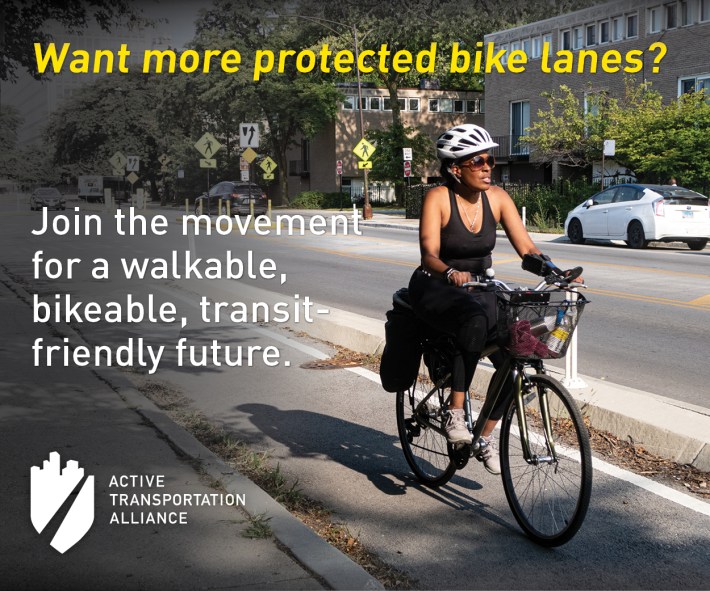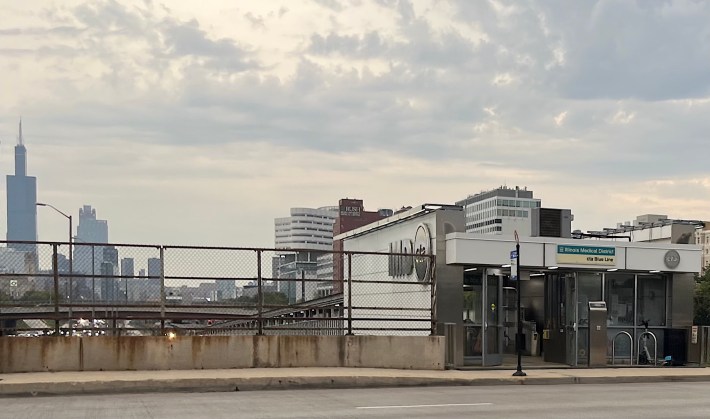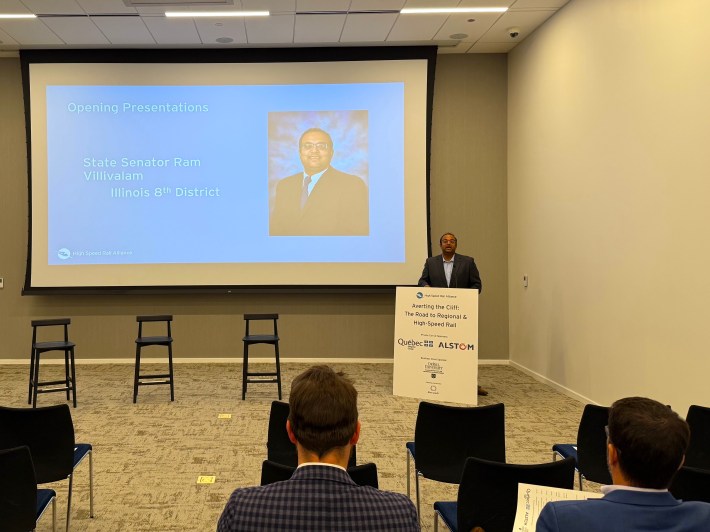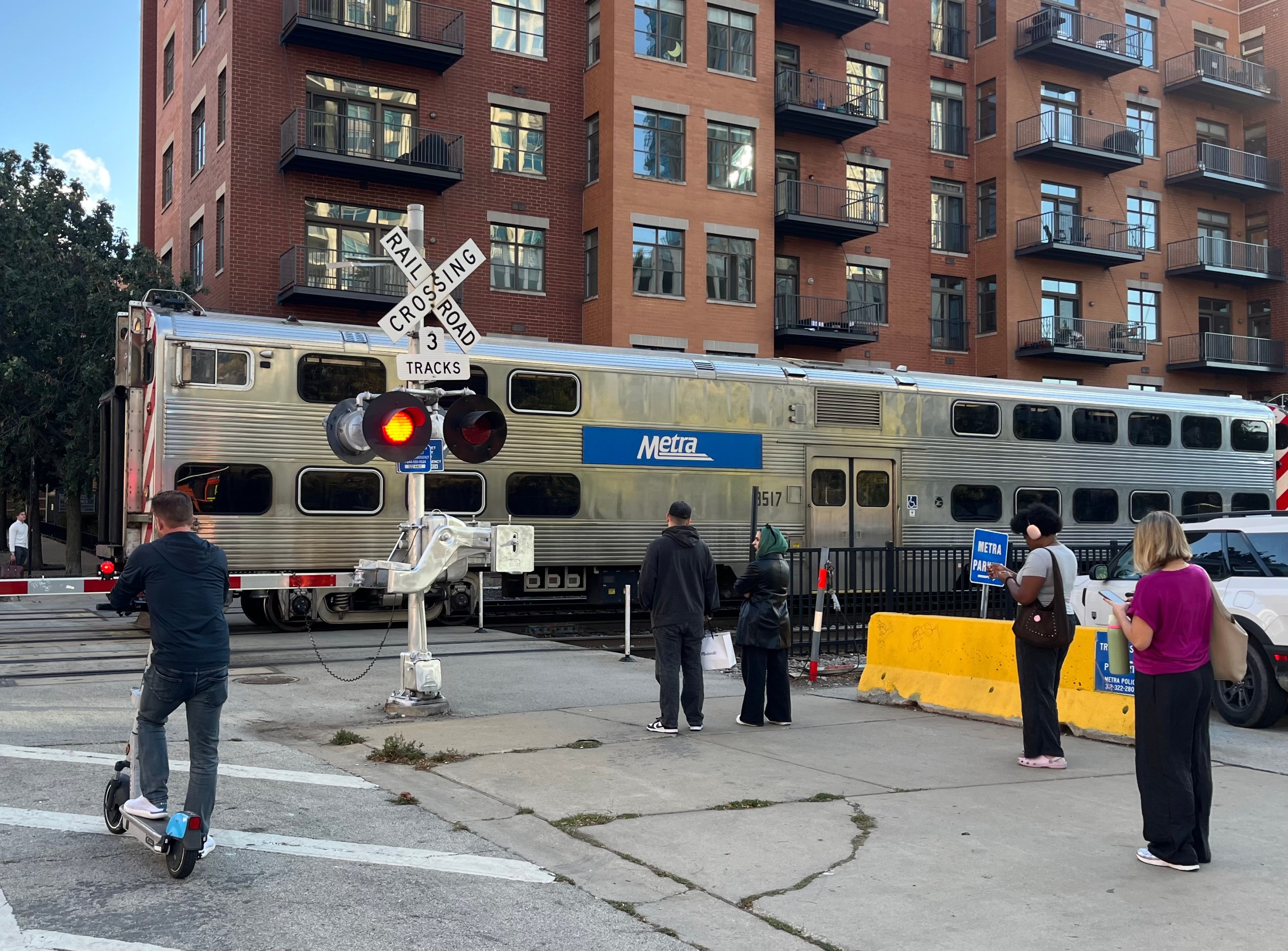
Last Friday's transit talk, "Averting the Cliff: The Road to Regional & High-Speed Rail" was supposed to feature State Rep. Kam Buckner, co-leader of the House's Public Transit Working Group, but he couldn't make it. So the question of who would take his place was a bit of a cliffhanger: Who would fill Buckner's Nikes?
Fortunately, one of the other key players in the current Springfield transit egislation drama was waiting in the wings, and he even happens to have a rhyming first name. Sen. Ram Villivalam, sponsor of the public transportation bill HB 3438 served as understudy for this event. Hosted by the High Speed Rail Alliance, it took place at the 120 S. Riverside building in the West Loop.
Also appearing that day was another speaker who is passionate about transit, and has worked hard to advocate for it, Active Transportation Alliance Executive Director Amy Rynell.

"I will say that my experience today was not the transit system we want," Rynell said at the talk. "I live on the Forest Park branch of the Blue Line, which is the Western Branch. So, for you Chicagoans, you may know that line, and that line is the set of tracks most in disrepair. It is almost all slow zones, and it is really painful to take. So on most days, I actually bike to work or bike to a different train line, because it's really hard to sit there in the middle of the highway seeing cars who are in rush hour traffic going faster than the train."

"But this morning, while I was on the train, a man came up to me, who was in town from another country with his wife who's running the marathon," Rynell added. "And he translated on his phone, 'is the train always this slow? Why is it so slow?' And then I translated back, 'It's in disrepair. It needs to be fixed. It is always this slow.' And he said, 'On Sunday, will it be this slow?' And I said, On Sunday, it will be slower.'"
When it was his turn to speak, Sen. Villivalam joked that the reason his hair is grayer nowadays than it looked in the photo projected behind him is the stressful transit reform and funding debates. He reiterated the transit-friendly Democrats' catchphrase, "no funding without reform": They don't expect taxpayers to chip in to save public transportation if they don't remix the current dysfunctional transit governance system.

During the Q&A, the Senator discussed how people can help get the legislation passed."Contact your state representative and your state senator, contact the Governor's Office, work with groups like Active Transportation Alliance to make sure you have the information about the legislation," he said. "We are at a moment where we negotiated the reforms part of the legislation, we believe we're in a good place. As usual, the funding part is always the hardest conversation. And so we're here to look at the plan that the House and the Governor's Office, are looking at, in terms of the $1.7 million funding. We're going to work with them to get this done, but contact your state rep, and your state senator, and let them know this is important for the entire state. If you live Downstate, and that's even it's incredibly important to make sure your reps and senators know the historic level of funding [$200 million] that was achieved for downstate transit as well in this legislation."
One of the afternoon speakers was Metra Director of Planning and Programming David Kralik. He talked about what the railroad is doing in the wake of the strategic plan that they came up with two years ago, frequently mentioning the word "evolution." He said they wanted to evolve from being largely a system for people going to and from work. Offering more frequent rail service would help them evolve to a system that's a good option for people making different types of trips at different times.
"Of course, the transition to becoming a regional rail operator isn't a switch we can flip overnight," Kralik said. "This will be an evolution that happens over time, but it also isn't something we have to wait for at some point in the far distant future. This is an evolution that we're already working towards, and it starts with operating schedules. As we came out of the COVID lockdowns, we were presented with a choice. Should we simply dust off the old schedules that we've been using in 2019, and work to implement those? Or should we build something different, something better? We took this latter option, and we've reimagined our schedules with more off peak service, more regular frequencies and simpler service patterns."
High Speed Rail Alliance Executive Director Rick Harnish spoke at the end of the program. He said he was conveying something Sen. Villivalam wanted to say but was unable to because he had to leave before the event was finished.
"The inter-city passenger rail portion of the bill is funded by the package delivery tax," Harnish said. "I am really annoyed with my tenants. They get five, six different deliveries every day. I'm happy to have those taxed. Tell your representatives in Springfield that that is a good surcharge."

Do you appreciate Streetsblog Chicago's paywall-free sustainable transportation reporting and advocacy? We officially ended our 2024-25 fund drive in July, but we still need another $42.5K+ to keep the (bike) lights on in 2026. We'd appreciate any leads on potential major donors or grants. And if you haven't already this year, please consider making a tax-deductible donation to help us continue publishing next year. Thank you!






